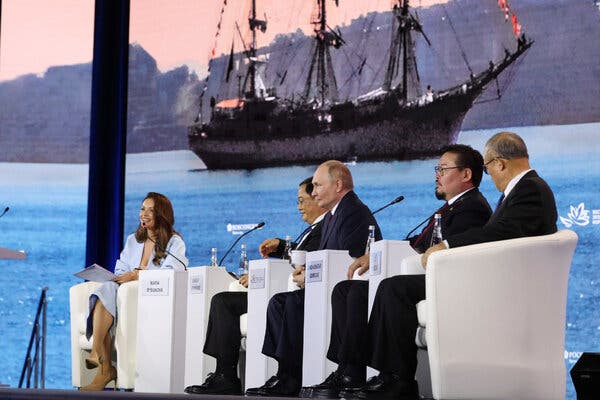UPDATE: In a high-stakes warning, Russian President Vladimir Putin declared that any Western troops deploying to Ukraine before a peace deal would become “legitimate targets.” This stark statement comes just one day after European leaders, including French President Emmanuel Macron, proposed sending forces to Ukraine to support a future peace agreement.
During an economic conference in Vladivostok on September 15, 2023, Putin emphasized the urgency of the situation, stating that it would be “practically impossible” for him to meet Ukrainian President Volodymyr Zelensky face-to-face. He suggested that any talks should occur in Moscow, a proposal swiftly rejected by Ukrainian officials.
“The Ukrainian side wants a meeting,” Putin claimed. “We are ready. And the best place for it would be the capital of our country.”
Ukrainian Foreign Minister Andrii Sybiha responded sharply on social media, accusing Putin of manipulating the situation with “knowingly unacceptable proposals.” This exchange reflects the deepening tensions as Ukraine grapples with ongoing conflict and the implications of international military support.
The backdrop to this confrontation is a recent summit where Macron announced that 26 countries pledged to secure any peace deal in Ukraine, signaling a united front against Russian aggression. However, specific details regarding troop deployments remain scarce, raising questions about the effectiveness of these commitments.
Putin reinforced his stance, stating that Western military presence would only be justifiable post-agreement, adding, “If they arrived afterward, their presence wouldn’t make any sense.” This declaration underscores the precariousness of the situation and the potential for escalation.
Critically, President Zelensky interpreted Putin’s invitation to Moscow as an attempt to sabotage direct negotiations. Such sentiments mirror broader concerns regarding Russia’s intentions and its willingness to engage constructively in peace talks.
Putin’s visit to Vladivostok followed a four-day trip to China, where he participated in a meeting with leaders such as Kim Jong-un of North Korea. This gathering showcased a coalition of autocratic leaders united against the U.S.-led West, further complicating the geopolitical landscape.
While addressing Russian economic leaders, Putin also hinted at potential collaboration with American companies on projects in Alaska and the Arctic, indicating his desire to shift focus from warfare to economic opportunities. He stated, “The United States is also a nation that belongs to the Asia-Pacific, and there are many interested parties that would like to restore or begin new work with us.”
As the world watches these developments, the urgency for a diplomatic resolution grows. The stakes are high, with the potential for further military engagement looming. Observers are now left to consider the implications of these statements and the future of peace efforts in Ukraine.
Stay tuned for ongoing updates as this situation continues to evolve.
